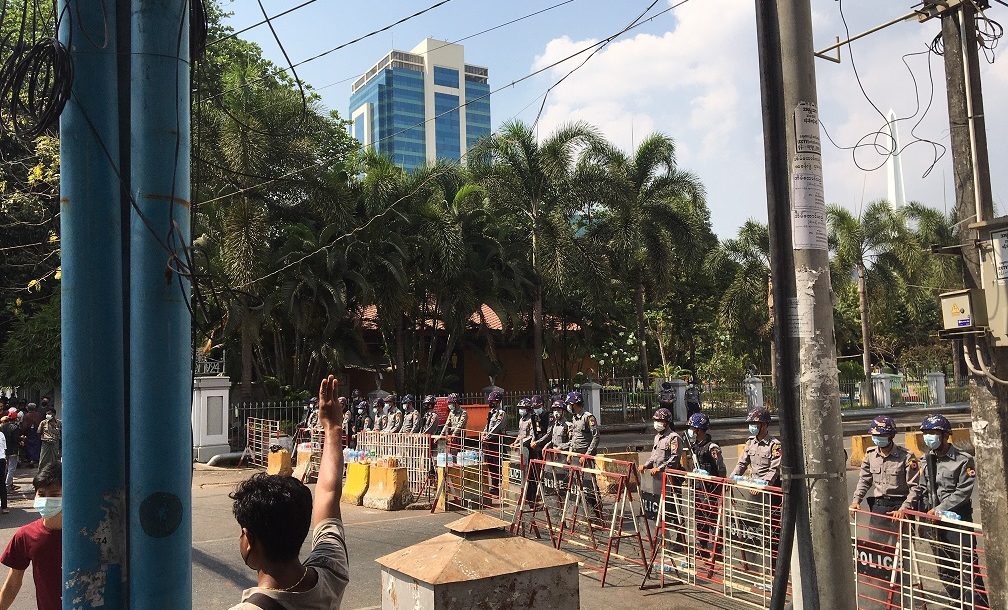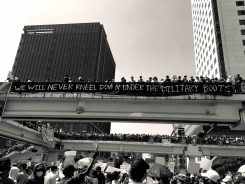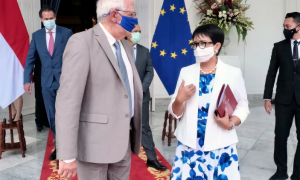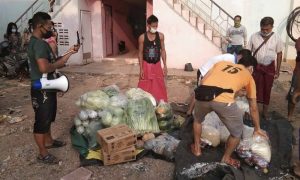“Politics first, economy second” was the remark that opened and set the theme for the final day of the 2021 Myanmar Update at The Australian National University (ANU).
With an economy currently in freefall as a result of COVID-19 and the February 1st Military Coup, the economic update was not optimistic. Rather than achieving the 7% economic growth predicted by OECD, Myanmar’s economy has shrunk by 10%. COVID-19 has been damaging worldwide, but the coup and resulting political instability have been detrimental to the economic development of Myanmar.
For context, the OECD prediction for Myanmar followed rapid economic growth over the past decade as a result of political transformation. This is one example which instils the sentiment of politics first, economy second in Myanmar.
The economic update was delivered by Vicky Bowman from the Myanmar Centre for Responsible Business and Dr Htwe Htwe Thein from Curtin University. While unified on the importance of economic recovery moving forward, each presented different recommendations. In particular, there was divergence when discussing the role of the international community.
Bowman recommended the expansion of economic policy, tax holidays for businesses based on assets and resources, skills and training programs to fill a gap in the market and an improved planning process focusing on liveability and conservation. Bowman expressed hope in the future of Myanmar’s economy and stressed the importance of protecting and maintaining economic reforms made since 2012.
Dr Thein anchored her update to the impact of the coup and the civil disobedience movement (CDM) on the economy, and brought the conversation to the international response to the current state of emergency in Myanmar. Recommendations included targeted sanctions and the boycott of military owned companies. The current political situation in Myanmar makes it increasingly impossible to continue business without compromising human rights, and businesses are faced with a decision to make about withdrawing from the country.
Reflections on the 2021 Myanmar Update in troubled times
...with COVID-19, and a coup, predicting the course of Myanmar’s future may best be put in the hands of the astrologers.
Thein concluded with an international call to action which urged the West to cut ties with the military and conduct business in line with the UN Guiding Principles on Business and Human Rights. Thein recommended that companies from ASEAN countries maintain business as usual to continue the provision of humanitarian and essential services. In question time, the recommendation for businesses to remain in Myanmar but to not pay taxes to avoid funding the purchase of arms and to starve the military’s of cash, was reiterated.
The feasibility of international businesses not paying tax in Myanmar was a point of contention during question time. Bowman highlighted that businesses are legally obliged to pay tax. If international businesses providing public resources such as energy withdraw, the fundamental role of energy in the enabling of human rights and provision of health services will be interrupted, as will the provision of COVID-19 relief, which is currently at its worst.
Bowman, uncomfortable with the movement encouraging tax avoidance established by CDM, instead encouraged adequately resourcing the tax department and improving tax morale to ensure the provision of public goods and services. This sentiment is particularly important with COVID-19 currently at its worst, with fatal shortages in resources such as oxygen. Bowman instead suggested the minimisation of interaction with the government and enhanced transparency. Transparency will strengthen companies and as a result the economy.
Throughout the update, the importance of targeting any sanctions imposed by the international community was also emphasised. Previous sanctions, such as the European Union trade sanctions that were lifted in 2011 following democratisation, have not had the intended impact on the military regime, stunting Myanmar’s economic development of compromising people’s quality of life. It is therefore imperative that any future sanctions are targeted to the economic interests of the military.
During the update, Bowman reflected that “the strongest [CDM] demonstrations opposing the February 1st coup were when people had money in their pockets… bringing people to a point of desperation is not a way of achieving democracy”. So perhaps, the economy does require prioritisation. However, this is essentially impossible given the current political situation and recent announcements that Min Aung Hlaing will take the role of Prime Minister, and elections will not take place for another two years. And so, Myanmar’s struggle for democracy continues. Hopefully economic development will follow.
The Economic Update was dedicated to Professor Sean Turnell who gave the 2019 Economic Update and is currently being held in arbitrary detention in Myanmar. Professor Turnell was detained in Myanmar on February 6, five days after the declaration of a state of emergency on February 1, when senior members of the National League for Democracy, including Daw Aung San Suu Kyi, were also detained. The Myanmar Research Centre encourages everyone to sign the petition calling for Professor Sean Turnell’s release. To view full list of signatories and to sign please visit the following link.
 Facebook
Facebook  Twitter
Twitter  Soundcloud
Soundcloud  Youtube
Youtube  Rss
Rss 



